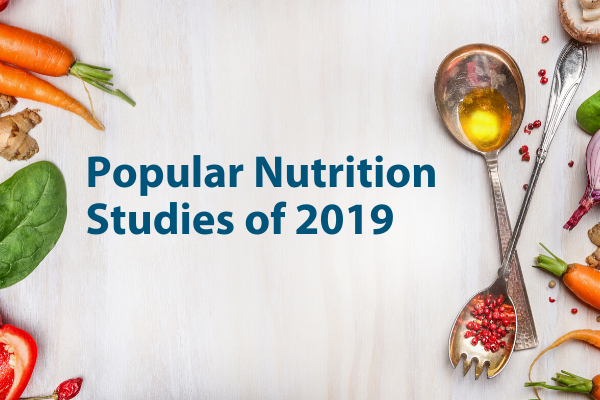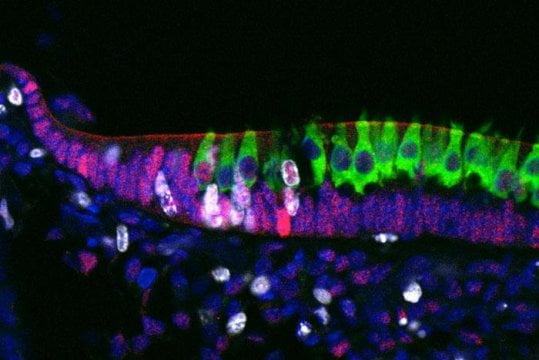
As 2020 begins, we took a look back at nutrition in the news during 2019. The most popular diet search according to Google was intermittent fasting, which we can attest was a popular search term in American Society for Nutrition’s content as well. But there’s much more to nutrition than trending diets and many more areas in the field of nutrition were researched and discussed this past year. Below we share 10 articles from ASN’s four peer reviewed journals that received high levels of attention in the news and social media.

Effects of red meat, white meat, and nonmeat protein sources on atherogenic lipoprotein measures in the context of low compared with high saturated fat intake: a randomized controlled trial
Authors of this study tested whether levels of atherogenic lipids and lipoproteins differed significantly following consumption of diets with high red meat content compared with diets with similar amounts of protein derived from white meat or nonmeat sources, and whether these effects were modified by concomitant intake of high compared with low saturated fatty acids.
This article was mentioned in 134 news outlets and tweeted about over 1,400 times! Here are 2 news articles about the study: Reader’s Digest and ABC News.

The Ketogenic Diet: Evidence for Optimism but High-Quality Research Needed
The author of the article says that “Based on available evidence, a well-formulated ketogenic diet does not appear to have major safety concerns for the general public and can be considered a first-line approach for obesity and diabetes. High-quality clinical trials of ketogenic diets will be needed to assess important questions about their long-term effects and full potential in clinical medicine”
Just published in December of 2019, this article has already received nearly 1,000 tweets mentioning it.

Meal Frequency and Timing Are Associated with Changes in Body Mass Index in Adventist Health Study 2
Scientific evidence for the optimal number, timing, and size of meals is lacking. The authors of this study investigated the relation between meal frequency and timing and changes in body mass index (BMI). Their results suggest that in relatively healthy adults, eating less frequently, no snacking, consuming breakfast, and eating the largest meal in the morning may be effective methods for preventing long-term weight gain. Eating breakfast and lunch 5–6 h apart and making the overnight fast last 18–19 h may be a useful practical strategy.
This article has been featured by 86 news outlets including Men’s Health and Medium. It’s also been popular on Twitter with over 1,100 tweets.

The Relative Caloric Prices of Healthy and Unhealthy Foods Differ Systematically across Income Levels and Continents
This study compared relative caloric prices (RCPs) for different food categories across 176 countries and ascertained their associations with dietary indicators and nutrition outcomes. The study concluded that relative food prices vary systematically across countries and partially explain international differences in the prevalences of undernutrition and overweight adults. Future research should focus on how to alter relative prices to achieve better dietary and nutrition outcomes.
This article received a lot of international attention and was mentioned in 27 news outlets. Two stories reporting on this research are from Medical Xpress and Business Standard.

Long-term coffee consumption, caffeine metabolism genetics, and risk of cardiovascular disease: a prospective analysis of up to 347,077 individuals and 8368 cases
The aim of this study was to examine if the CYP1A2 genotype or a genetic score for caffeine metabolism (caffeine-GS) modifies the association between habitual coffee consumption and the risk of cardiovascular disease (CVD). The authors concluded that heavy coffee consumption was associated with a modest increase in CVD risk, but this association was unaffected by genetic variants influencing caffeine metabolism.
This article was popular on social media and in the news. 45 news outlets reported on the study, including Women’s Health and CNN Health.

Perspective: Should Exclusive Breastfeeding Still Be Recommended for 6 Months?
Breastfeeding is always a popular topic in nutrition and in this study, authors reviewed the evidence behind concerns related to the WHO’s recommendation for exclusive breastfeeding of infants for the first 6 months of life.
The New York Times covered this study and it also was also popular on social media during National Breastfeeding Month.

Resveratrol: How Much Wine Do You Have to Drink to Stay Healthy?
In this review, authors discuss the proposed therapeutic attributes and the mode of molecular actions of resveratrol. They also cover recent pharmacologic efforts to improve the poor bioavailability of resveratrol and influence the transition between body systems in humans. The authors conclude with some thoughts about future research directions that might be meaningful for resolving controversies surrounding resveratrol.
Wine is often in the news and this study is no different. It was reported on by 59 news outlets, including Omaha Public Radio and the Brisbane Times and tweeted about over 200 times.

Blood type diets lack supporting evidence: a systematic review
A systematic search was performed to answer the following question: In humans grouped according to blood type, does adherence to a specific diet improve health and/or decrease risk of disease compared with nonadherence to the diet? The Cochrane Library, MEDLINE, and Embase were systematically searched by using sensitive search strategies. The authors concluded that no evidence currently exists to validate the purported health benefits of blood type diets. To validate these claims, studies are required that compare the health outcomes between participants adhering to a particular blood type diet (experimental group) and participants continuing a standard diet (control group) within a particular blood type population.
Although it’s been around for a while, this article remains popular in the news. It’s been reported on by 27 news outlets, tweeted almost 3,000 times, and had 7 videos created about it. Some news stories include this one from Prevention and another from The Healthy.

Multiple Vitamin K Forms Exist in Dairy Foods
The plant-based form of vitamin K (phylloquinone, vitamin K-1) has been well quantified in the US diet. Menaquinones (vitamin K-2) are another class of vitamin K compounds that differ from phylloquinone in the length and saturation of their side chain, but they have not been well characterized in foods. The authors of this study conclude that, to the best of their knowledge, this is the first report of menaquinone contents of US dairy products. Findings indicate that the amount of vitamin K contents in dairy products is high and proportional to the fat content of the product.
This article has been featured in Wikipedia, multiple news outlets, and remains popular on Twitter.

Association Between Organic Food Consumption and Breast Cancer Risk: Findings from the Sister Study (P18-038-19)
Diet is a source of exposure to pesticides. Organic food consumption may lower cancer risk, possibly due to decreased exposure to pesticides. Few studies have investigated the association between organic food consumption and cancer risk and evidence on the risk of breast cancer is limited. Although unmeasured factors associated with consuming organic foods may explain these results, organic produce consumption was associated with reduced breast cancer risk.
This abstract, presented at Nutrition 2019 in Baltimore, MD and published in Current Developments in Nutrition, was popular on social media being discussed on blogs, Facebook, and receiving over 132 tweets since publication.
[“source=nutrition”]


















